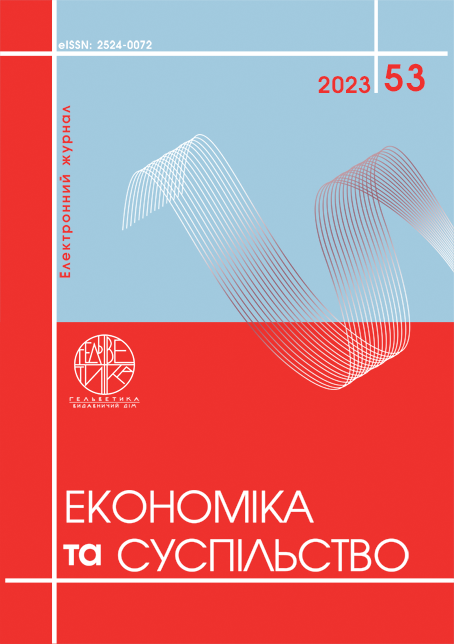MODERN APPROACHES TO CHANGE MANAGEMENT IN THE COMPANY'S PERSONNEL MANAGEMENT SYSTEM
Abstract
The purpose of the article is to develop theoretical and applied approaches to change management in the personnel management system and to substantiate the optimal sequence of management steps for the organization of this process in the company. The relevance of the study of this issue is confirmed by the fact that the changes that are taking place intensively in the external environment require changes in the personnel management system of companies, which cannot remain stable for a long time. In order to achieve the goal, the methods of logical and comparative analysis, synthesis, monographic, and generalization were used, which made it possible to obtain a number of results. Four main stages are distinguished, according to which the change management process in the company's personnel management system should be organized (preparatory-diagnostic; resource; activity; monitoring-evaluation) and management actions that should be planned and implemented at these stages are defined. It is emphasized that the main objects of changes within the personnel management system are: the purpose and architecture of the corporate personnel management system; priority of personnel management tasks; methods and technologies of personnel management. The positive and negative consequences of the change management process implementation in the personnel management system for the company and employees are classified. It is noted that changes in the personnel management system are team changes, and therefore a change leader must be identified, a change management team must be formed from managers and personnel managers, and the team must be prepared for the implementation of the change management process. The practical value of the article lies in the fact that the proposed sequence of management steps for implementing changes in the company's personnel management system can be implemented in the practice of any company (regardless of the form of ownership, size, type of economic activity). This will improve the quality of the company's management, the effectiveness of implementing changes, and reduce the resistance that arises from staff and officials regarding the implementation of changes in the personnel management system.
References
Кужда Т. Етапи успішного управління організаційними змінами на підприємстві. Галицький економічний вісник. 2013. № 2(41). С. 66–72.
Опитування щодо впливу війни на підходи до управління людським капіталом: Deloitte. URL: https://www2.deloitte.com/content/dam/Deloitte/ua/Documents/Press-release/AmCham-Deloitte-Survey-on-impact-of-war-on-HC_UKR.pdf (дата звернення: 05.05.2023).
Павленко М.С., Мельник А.О. Менеджмент персоналу в системі ефективної діяльності підприємства. Вчені записки ТНУ імені В. І. Вернадського. Серія: Економіка і управління. 2020. Том 31 (70). № 2. С. 13–18.
Приймак Н.С. Сучасні підходи до управління змінами. Причорноморські економічні студії. 2019. Випуск 38-1. С. 72–76.
Пріб К. А. Формування системи управління змінами на підприємстві. Інтелект ХХІ. 2014. № 2. С. 119–126.
Стратегії організаційних змін та їх успішна реалізація. URL: https://britishmba.in.ua/stratehii-orhanizatsiinykh-zmin-ta-ikh-uspishna-realizatsiia/ (дата звернення: 18.05.2023).
Турчіна С.Г. Система управління змінами як складник успішного розвитку підприємств. Східна Європа: економіка, бізнес та управління. 2017. Випуск 3 (08). С. 199–203.
Lewin K. Feild Theory in Social Science: Selected Theoretical Papers. Edited by Dorwin Cartwright. New York: Harper & Row, 1951. 346 p.
Kuzhda, T. (2013) Etapy uspishnoho upravlinnia orhanizatsiinymy zminamy na pidpryiemstvi [Stages of successful management of organizational changes at the enterprise]. Halytskyi ekonomichnyi visnyk, 2(41), 66–72. Available at: https://core.ac.uk/download/pdf/60849798.pdf [in Ukrainian]
Opytuvannia shchodo vplyvu viiny na pidkhody do upravlinnia liudskym kapitalom [Survey on the impact of war on human capital management approaches]: Deloitte. Available at: https://www2.deloitte.com/content/dam/Deloitte/ua/Documents/Press-release/AmCham-Deloitte-Survey-on-impact-of-war-on-HC_UKR.pdf [in Ukrainian]
Pavlenko, M.S. & Melnyk, A.O. (2020) Menedzhment personalu v systemi efektyvnoi diialnosti pidpryiemstva [Personnel management in the system of effective enterprise activity]. Vcheni zapysky TNU imeni V.I. Vernadskoho. Seriia: Ekonomika i upravlinnia, 31 (70) № 2, 13–18. DOI: https://doi.org/10.32838/2523-4803/70-2-40 [in Ukrainian]
Pryimak, N.S. (2019) Suchasni pidkhody do upravlinnia zminamy [Modern approaches to change management]. Prychornomorski ekonomichni studii, 38-1, 72–76. Available at: http://nbuv.gov.ua/UJRN/bses_2019_38%281%29__16 [in Ukrainian]
Prib, K.A. (2014) Formuvannia systemy upravlinnia zminamy na pidpryiemstvi [Formation of a change management system at the enterprise]. Intelekt XXI, 2, 119–126. Available at: http://www.intellect21.nuft.org.ua/journal/2014/2014_2/13.pdf [in Ukrainian]
Stratehii orhanizatsiinykh zmin ta yikh uspishna realizatsiia [Strategies of organizational changes and their successful implementation]. Available at: https://britishmba.in.ua/stratehii-orhanizatsiinykh-zmin-ta-ikh-uspishna-realizatsiia [in Ukrainian]
Turchina S.H. (2017). Systema upravlinnia zminamy yak skladnyk uspishnoho rozvytku pidpryiemstv [Change management system as a component of successful enterprise development]. Skhidna Yevropa: ekonomika, biznes ta upravlinnia, 3 (08), 199–203. Available at: http://www.easterneurope-ebm.in.ua/journal/8_2017/37.pdf [in Ukrainian]
Lewin K. Feild Theory in Social Science: Selected Theoretical Papers. Edited by Dorwin Cartwright. New York: Harper & Row, 1951. 346 p.

This work is licensed under a Creative Commons Attribution 4.0 International License.


